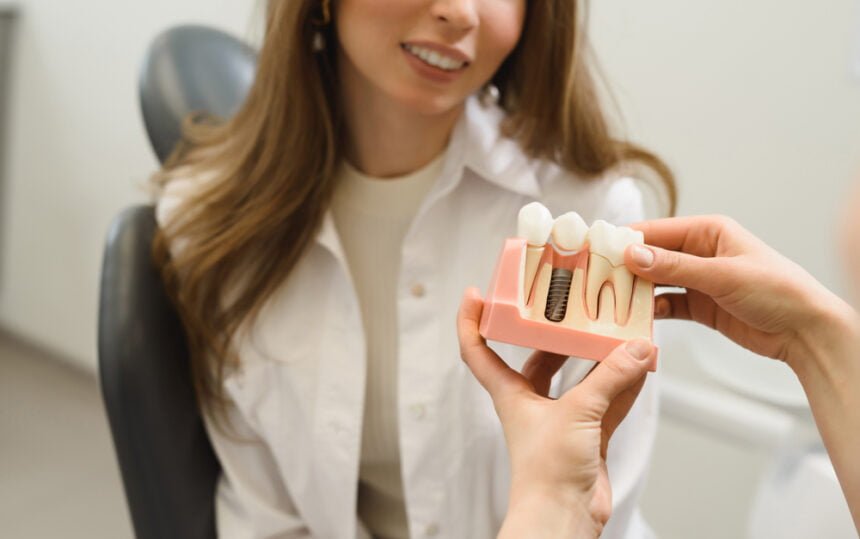Believe it or not, about two-thirds of adults stand at risk of experiencing tooth extraction complications. It can, for instance, be caused by different factors, such as the decomposition of lost or decaying teeth, periodontal or gingival disease, physical injury, and even genetics. Loss of teeth is a dent in the beauty of your smile, but can also have harmful effects on your oral health and as a whole your health. Eating may become more difficult, lisp, and reduced self-confidence as a result of tooth loss are just a few of the symptoms associated with missing teeth.
Although dental health has been the most critical aspect of general health, modern dentistry offers incredible inventive solutions to get back your smile and proper oral function. Implants turned out to be a complete innovation approach in the teeth replacement field, which caused dentures and bridges were not the only options anymore.
Understanding Dental Implants: A Permanent Anchor for Your Smile
A dental implant is a biocompatible screw made of titanium, which is drilled into the jaw bones. With a function of a custom-made screw, instead of the natural tooth root, here is a foundation that ensures restorations last forever. The implant alone will not be the entire system as there will be integration into other components. The abutment, a small connector member, is placed on the implant once the process of its integration into the jawbone is completed. The last step, which is to connect the last link which is the crown, bridge, or denture to the abutment that will be fastened to the abutment, comes to an end after a long process. Unlike dentures or bridges that anchor on the healthy adjacent teeth for support, implants are independent, self-sustaining dental structures with some of the best long-term stability and durability.
Are Dental Implants Right for You? Exploring Candidacy
While dental implants offer a multitude of benefits, they may not be suitable for everyone. Factors influencing candidacy include:
- Jawbone Health: The mounting point with sufficient jawbone density is an imperative condition for correct osseointegration, which is also the process when the jawbones are fused with the implant. It is possible that bone loss would take place for a long period since a patient would have fewer teeth. The damaged bone will demonstrate the need for bone grafting procedures to create a supportive platform for the implant.
- Overall Health: Some medical conditions, specifically, may demand carefulness before surgical procedures of dental implants. Dental evaluations do not only involve medical examination by the doctor or dentist since proper assessment is prioritized.
- Smoking Habits: Smoking tobacco is a bad influencer of the operating outcome of the recovery and the overall loss of the implant. Smokers should stop smoking one month before, as well as after the surgery.
The appointment would include an examination by a professional, and usually an oral surgeon, to ensure that your bones are healthy, your overall health is good, and that you are eligible for implants, dental implants. In most cases, the consultation process includes taking either X-rays or 3D imaging so as to evaluate bone densities and then devising a personalized treatment plan.
The Dental Implant Procedure: A Step-by-Step Journey
The dental implant procedure typically involves several stages:
- Initial Consultation: It is a detailed orientation proceeding with a medical history and goals discussion between a dentist or oral surgeon, followed by a clear explanation of the possible treatment options for your case. X-rays or 3D scans can be used to see the health status of your jaws and plan the placement site for the implant.
- Dental Implant Placement: While under local anesthesia or general anesthesia, depending on the situation, the dentist or the oral surgeon will be using a drill to surgically insert the implant screw(s) into the jawbone beneath the gums. Modern tools and dental imaging combined as 3D allow skilled placement of implants for no-hassle success and less pain discomfort.
- Healing Period: The bone-to-implant bonding process will be followed by an even longer waiting time of several months to enable the jawbone to fuse with the implant through osseointegration. While this is happening, works of temporary restorations would likely be done to keep the aesthetics and function during the eating process.
- Abutment Placement: After the implant accepts the bone (integrating totally), the dentist will mount a small connecting piece (abutment) on the implant.
- Final Restoration: The final abutment, crown, or denture, specifically designed for a natural look and perfect fit, is firmly bonded onto the abutment. The finished restoration is now ready to be applied to your mouth, restoring your natural smile, bite function, and oral esthetics
Why Choose Dental Implants? A Brighter Smile and Improved Quality of Life
Dental implants offer a multitude of advantages compared to traditional tooth replacement options:
- Enhanced Aesthetics: Unlike dentures which require special adhesives to stay on, implants offer a permanent fixture for permanent fixes that duplicate the performance and peaceful feeling of natural teeth. They match your teeth and combine perfectly, hence, you gain that genuine healthy image again.
- Improved Bite Function: One clear difference would be that dentures are likely to slip fit or become loose, however, implants are strongly fixed in place in the jawbone which subsequently allows for more normal chewing and biting, similar to natural teeth. This, in turn, aids in digestion and better maintains dental health.
- Increased Confidence: A full, healthy smile is involved obviously in the self-esteem process. Replacement of the missing tooth supports normal functions as a smile, speech, and eating daily which in turn increases one’s self-confidence and the quality of their life.
- Durability and Longevity: Dental implants are famous and particularly less perishable solutions for the dental treatment aspects. As long as with the help of meticulous oral hygiene and regular check-ups dental implants can serve for many years, even decades, so they are a good way for you to be healthy oral.
Considerations and Potential Risks: An Open Conversation
Although dental implants can lead to many benefits, it is also helpful to think about other factors that may be involved and to talk about them with your dentist or oral surgeon. These may include:
- Cost: When you undergo the implant process, you purchase the entire setup for the artificial teeth which is more costly than the other traditional tooth replacement alternatives. Nevertheless, these machines possess a vital attribute in their long-term sustainability and success which makes them cost-effective solutions in the long run.
- Surgical Risks: As one can witness in any surgical case, disorders like infections or bleeding may be a minimal risk. Although several dentists and oral surgeons undertaking a detailed approach and using sterilization protocols are possible, these considerations reduce the risks.
- Discomfort: As it is done under anesthesia, people may experience some minor pain during the recovery, but it rarely leads to heavier discomfort. The dentist will give you a prescription for any kind of pain medication and also give you instructions for aftercare which you integrate for proper care and management of the pain.
Caring for Your Dental Implants: Ensuring Long-Term Success
Sustaining the best oral hygiene is the fundamental condition for your dental restorations and implants to survive. Dental implant undergoes the same maintenance regime as your natural teeth in the hands of professional cleaners and dentists who have to check them out for gum disease and maintain implant health in the best way.
Conclusion: A Brighter Future Starts with a Smile
The loss of teeth is an issue that can crucially influence your lifestyle. Implants in dentistry offer a new and groundbreaking solution, again bringing back your smile and at the same time a sound psyche and health together. Being attractive, allowing it to function like a natural tooth, and having a long-term durability performance, dental implants are the like-minded choice for your oral well-being and living standard. When you are thinking about replacing some lost teeth and want to learn about the to-be-beneficial options of dental implants, you can contact a trusted dentist or oral surgeon around you. In the case that you have been told that you are an eligible candidate for getting the best dental implant in charleston‚ think about the most reputable institution to discuss your candidacy and to move forward on the way toward a happy future with the best smile you can hope for.






